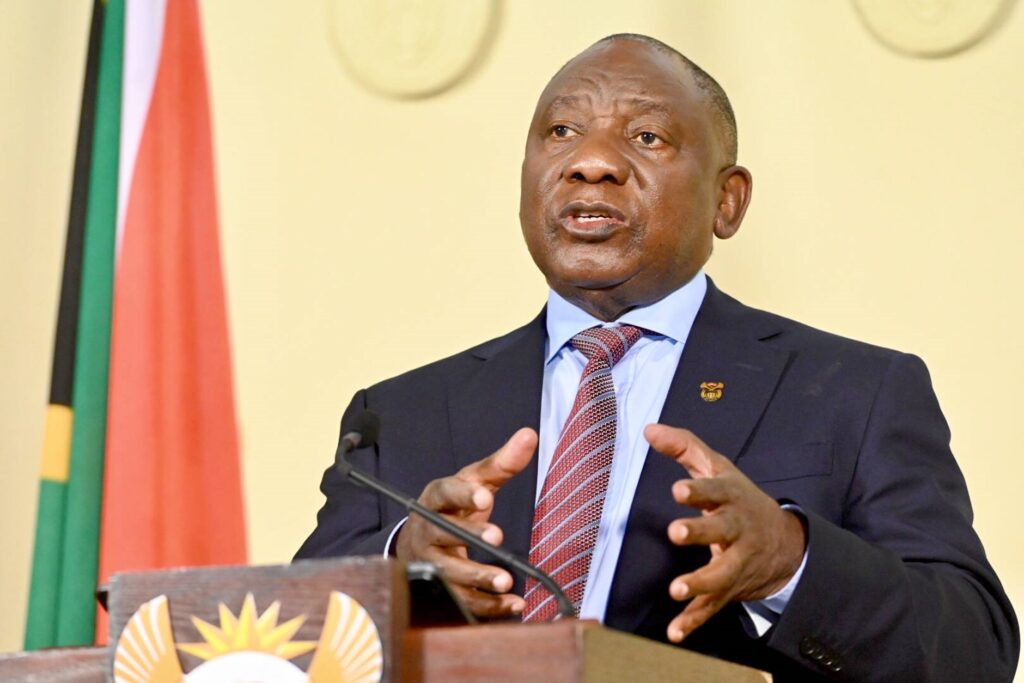President Cyril Ramaphosa has made it official. He has named his cabinet, in accordance with the fruits of the Government of National Unity. Deputy President Paul Mashatile will remain in his position while Democratic Alliance Leader John Steenhuisen will assume the portfolio of Agriculture Minister.
In a move likely to be welcomed by the markets, the opposition Democratic Alliance, which won 21.8 per cent of the vote in the recent elections, was given six of the 32 ministerial positions and the position of deputy finance minister. Ramaphosa included eight parties in his cabinet, but the country’s two most radical political groups, Julius Malema’s Economic Freedom Fighters (EFF) which had campaigned on expropriating land, and uMkhonto WeSizwe (MK), run by former ANC president Jacob Zuma, were not included. The rand immediately strengthened to about R18.50 it had hit a few days earlier when it looked like the coalition talks with the DA might collapse. Fierce haggling between the two largest parties led by the DA accusing Ramaphosa of reneging on an offer to let it run the powerful trade and industry ministry, while the ANC in turn accused the DA leadership of high-handedness.(Finance Times)
The DA appears to have been rather reluctant about entering into a coalition with the ANC out of fear that it could backfire. They do not want to end up looking like the fools when they have been opposing many of the ANC’s negative policies over the years. The ANC would still hold the majority of cabinet portfolios in the coalition but the DA could now at least wield some indirect political influence. Minority parties in the “GNU” will have relatively zero to no influence outside the respective portfolios they have been given. The EFF and the MK have always been reaching for the sun with their demands, not realizing the damage that their policies could do. The DA too had been rather insistent on its demands to be represented in the portfolios they were asking for, but they were more rational in their approach. Not everyone can be made happy.
Tense negotiations, mainly between the ANC and Democratic Alliance (DA), the biggest parties in the coalition, led to delays this week of President Cyril Ramaphosa announcing his Cabinet in the Government of National Unity (GNU). Fears were heightened and markets reacted badly to news of DA leader John Steenhuisen threatening to withdraw from the coalition amid leaks of letters between the two parties’ leaders showing themselves at loggerheads. But by Friday, as Ramaphosa was due to meet Steenhuisen, the political bartering that characterised the last two weeks of talks showed signs of an imminent agreement. The rand – which fell amid news of the discord – strengthened following indications that a cabinet announcement was pending and the government would include the market-friendly, right-leaning DA. (Al Jazeera)
The part which Ramaphosa was instrumental in chartering for the GNU shows that he needs to balance all stakeholders. The largest of these are the DA and the Inkatha Freedom Party (IFP). Arguments such as the ones experienced between the DA and the ANC are normal in any negotiations. The conclusion reached is that the party with the largest number of seats determines how much influence the second largest party will have. The markets can rest assured that the DA will still wield considerable influence. It will depend on how they use. The letters exposing the pressures Steenhuisen and Ramaphosa experienced, did not have to be so dramatic. Steenhuisen had been asking for too much but he limited his demands, he was able to allow Ramaphosa to compromise between ministerial and deputy ministerial posts.
Political analyst Khaya Sithole said markets were in favour of the DA being part of the GNU – a multiparty coalition – because the party is unlikely to demand radical shifts in economic policy. “A GNU with the DA gives the perception that there will be continuity in economic policy because the ANC will maintain the trajectory it was on,” Sithole told Al Jazeera. He said the DA – which holds 87 parliamentary seats compared with the ANC’s 159 – would not demand new policies or have sufficient political muscle to push through radical changes. “Markets are buying into the continuation of government policies and programmes,” Sithole said, adding that, “an ANC partnership with the DA does not upend the script.”(Al Jazeera)
The DA and the ANC still have differing ideologies that can easily clash. The GNU will certainly hold, depending on how the major stake holders and the minority parties navigate each other. The agreement between the DA and ANC could hold, but for how long it cannot be said. A lot could change in a few years depending on circumstances. The DA might see that some of its internal policies could be made into law while negotiating with the ANC concerning what shape government policies take. The DA is the second largest party in the coalition while the ANC has the lion’s share of top portfolios. The DA there fore has to be diplomatic on how it can be a moderating influence on the polices of the ANC.
It could prove itself to be a bumpy ride for the new administration and era under Ramaphosa’s watch.
Article written by:
Yacoob Cassim
Journalist at Radio Al Ansaar






